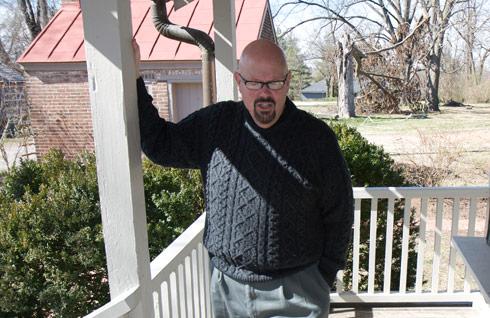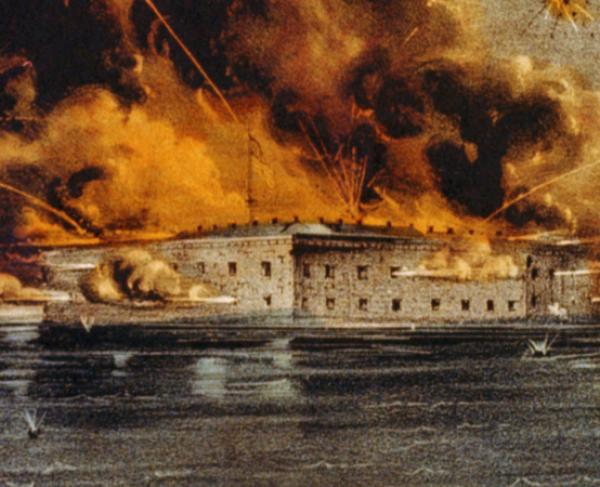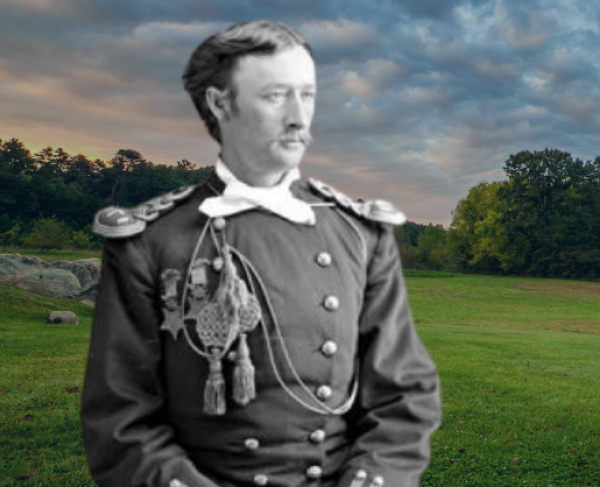Robert Hicks

Hallowed Ground Magazine, Fall 2009
Novelist and preservationist Robert Hicks is the troubadour of Franklin, Tenn. In a recent interview he shared his thoughts on the battlefield, its resurgence and the role of historic fiction.

Civil War Trust: Where did your interest in the Civil War come from?
Robert Hicks: My grandfather was born the year before the Civil War — he had actual memories of Grant’s army at his family farm in West Tennessee. When dad and his siblings were small, my grandfather would have his brood in a touring car and would point over at some hill and say, “See that hill, Grant’s army came over that hill on its way to Shiloh.” Then when my parents had married and had a family, we would be in the station wagon riding down the road and my dad would say, “See that strip mall, Grant’s army came right through there.” So even though it was oral tradition, there was a huge connection. We were taught to see land as it was with strip malls and development, but also to see what it had been.
What is your favorite battlefield?
RH: Franklin is the easy answer; but after that, Parker's Cross Roads. Sometimes I’m as caught up in what’s happened to preserve hallowed ground as I am in the history of the individual battle. Parker's Cross Roads really represents the heroics of history and the passion of reclamation and preservation. It seemed like such a lost cause — there’s a highway running through the middle of it, for Pete’s sake. Yet, every time I’m there I shake my head in gratitude and amazement. Who could look at a site like that and see that it could be saved? Steve McDaniel and a group of truly dedicated folks could and did. It’s the best illustration of what immense passion can accomplish.
I’m keenly aware of what went into my ability to walk that ground. So sites that I know involved a real vision and struggle always have special meaning, but for sheer beauty, my favorite is Antietam.
What aspect of the Civil War most resonates with you?
RH: The Civil War is the moment where we become the nation on earth with the longest immigration line. I was in Ireland last February, it was beautiful and it’s great, but there aren’t as many people clambering to get in. I love Argentina, and in the 19th century tens of thousands of people went there, just like the U.S. But for us, that stream never stopped. It was because of the Civil War and what it says about our ideals and the better angels of our nature. My passion for the Civil War only grows with age.
How did you come to be involved in historic preservation efforts?
RH: I moved to Franklin in 1974, and it was a different town than what you see today. Probably 1/3 of Main Street might as well have been vacant and boarded up. In those days, “fresh blood” was recruited into volunteer efforts of some kind. I came to understand that community service is a real part of the “rent we pay” as members of any community. After settling in, I got involved in several projects, one of which was Carnton Plantation. I should have known myself well enough to know I would become so passionate.
You made the New York Times Bestseller List for your first novel, The Widow of the South. What inspired you to write that particular story?
RH: Those more than 20 years of volunteer work at Carnton. Of course, on some level, we all knew the story, but I wanted to know it more intimately. Why is the largest private military cemetery in the backyard? How did the battle affect the people who lived in that house? It’s a great story, but there were missing parts — the motivations and emotions. And at the core of it all was my personal passion for Carnton and Franklin. I was heading-up most of the fundraising for this house museum that had never received public funding nor had a patriotic organization or major family or foundation or much of an endowment behind it. How could I bring people here, to Carnton and to Franklin, in the process? I began to believe that if we could just tell the story, we could get people to come and the future would be secure.
The novel was part of a tremendous renewal of interest in the Battle of Franklin. In just a few years, the community has become a true poster child for reclaiming historic sites and embracing heritage tourism. How does it feel to have contributed to this resurgence?
It feels great when things succeed! There are so few times in life where things turn out like we dreamed and hoped they would be. One of the greatest privileges I’ve ever had is to live that dream and be part of it. And I mean just a part of it. I’m part of a great community — not just Franklin; people from the preservation community across the nation have stuck with us through so much. They embraced our story, as they are coming to realize that it is their story. The book was one part of it and I’m proud to have helped. But it wouldn’t be near what it is without the work of so many men and women in this growing community who really “get” the importance of those five bloodiest of hours at Franklin.
What do you hope for the future of Carnton and Franklin?
RH: Preservation in Franklin continues to go through new doors and is becoming greater. Five years ago, Jim Lighthizer told us we needed to cooperate to be successful. We listened and Boy, have we! Now, the various battlefield sites and house museums are coming under one mantle — the new Battle of Franklin Trust. Thee will have united administration, but more importantly, we’ll tell a united story. We need to discuss the entire impact of the battle on the community and the 9,200 men and boys who became casualties that night. This community was touched by war and forever changed. That’s the story we need to tell. Not to deemphasize the stories of individual sites, but to tell them in context. I foresee that we are standing on an amazing threshold for the future as we become one organization. I think the cotton gin will be reconstructed. I think you’ll be able to see the old trench lines and the cenotaph built to Cleburne reconstructed. This is an amazing time, our best yet. We’re not just the poster child for what a community can do; we’re also the poster child for the cooperation it takes to get there.
What do you think it is about the Civil War era that inspires so many writers, both novelists and historians?
RH: Last year I was speaking at Trinity College in Dublin. I don’t know where the sentiment comes from, whether it’s a quote or not, but the professor introducing me said, “If you want to look at the full gamut of the human experience — good and bad, nobility and cowardice, heroism and deceit — you have three sources; you have holy scripture, Shakespeare and the American Civil War.”
I think that’s why writers come back to it and why it fascinates people the world over. It’s because in the Civil War you can see the best and worst of what people can be. It’s not just the details of the war, it’s about the human condition and what we can be, who we are, who we should and shouldn’t be.
Tell us a little about your forthcoming novel, A Separate Country.
RH: This story was my way of continuing to talk about the Battle of Franklin. I felt if I stayed physically in Franklin and wrote from that perspective, I was telling the same story again. I wanted to write about how these ?ve bloody hours continued to affect people throughout their lives, no matter where they went. John Bell Hood, who went to New Orleans and tried to build his life again, was an ideal character. I wanted to show how this place that nobody in New Orleans had ever even heard of continued to impact him. I also wanted to write about New Orleans, another place I love and the only other place I’d want to live. I wanted to address themes from Widow of the South — transformation and redemption. I felt I could talk about this in real historic characters and others who came out of my head. It’s a story about New Orleans, and it’s about John Bell Hood. But it’s also about transformation and, ultimately, redemption.
The pre-publication reviews of A Separate Country outstanding. Did you ever fear that your second novel would be labeled as ‘sophomore slump?’
RH: If you only knew. It has seemed like the giant cloud of ‘sophomore slump’ has trailed around me from the moment The Widow of the South was embraced by readers. Folks would openly remind me that I would never be able to write a book like it again. Time will only tell whether folks embrace this book. But my goal was to write a better book, to have grown as an author. However the book sells, those reviews you spoke of are a gift. I am both grateful and humbled by their generosity.
What role do you think historical novels can play in getting young people interested in studying the Civil War?
RH: I often say all this began with Shelby Foote advising me to be a storyteller, not a historian. A year or so ago, I was part of a symposium and the final question was: What’s the paramount question facing us at the Civil War sesquicentennial? The scholars said “Was the war over slavery or states’ rights?” I wanted to ask whether the slavery question wasn’t just the chief states rights issue. But I said, in all seriousness, “Will the American Civil War continue to be relevant?” If not, we’re doomed for it to be the remembered like English Civil war, with little impact on everyday lives. I believe it’s the most relevant historical aspect of who we are and what we’re becoming in this country. What does it say about us as a people? It’s important for people to understand the ideals born out of the war and the magnitude of the cost to us as a nation. I don’t believe that understanding troop movements gets that across. People need storytellers to capture their interest and that’s the role that the novel plays. There have been studies and books about Franklin since within months of the battle, and yet the battlefield languished. It took a novel to bring people to Franklin and breathe life into it.
Although you always make it clear that you are writing fiction, what would you hope might come out of any success that might come with A Separate Country?
RH: I’m glad you understand it is fiction. Somehow there are those folks who think “historic fiction” is still somehow supposed to be “history.” All historic fiction should promise you is that it’s fiction set in history. Shakespeare sets that bar with Richard III, Macbeth and all the rest. You don’t read Shakespeare’s histories to understand history; you read them to better understand yourself.
First and foremost, I continue to seek the reevaluation of the Battle of Franklin and its role in the Civil War and our nation’s greater history. Please understand I don’t see the battle as isolated from either the war in the west nor the final outcome of the war.
In the years afterwards, some historians got the importance of the battle within its context. They saw its importance in what happened there and what didn’t happen there. In my way of thinking, the Southern cause was pretty much doomed after the Federals took control of the Mississippi. Yet, if Franklin had turned out different, the war could have been extended for another six months or more. How many more deaths would that have involved? I believe that Franklin is not where the Old South lives, but where it died.
Secondly, I hope that A Separate Country will lead folks to reevaluate John Bell Hood. Sometime in the mid-20th century, historians seem to have remolded Hood into a cartoon character. I think it was the keystone in dismissing the importance of Franklin. After all, if Hood was nothing more than a drunken, drugged up, revengeful, ego-maniac wracked with pain, then Franklin could have been nothing more than his spawn. I continue to ask myself what choices he had that morning. Hopefully, I will stir the pot enough to get real historians, like Eric Jacobson, to continue to reevaluate Hood’s role and the importance of the Battle of Franklin.
Finally, I hope my love of New Orleans, so full of sorrow, full of grace, shines throughout the story.
A Separate Country was released nation-wide by Grand Central Publishing on September 23, 2009. For more information go to www.robert-hicks.com. Or visit www.aseparatecountry.com.


